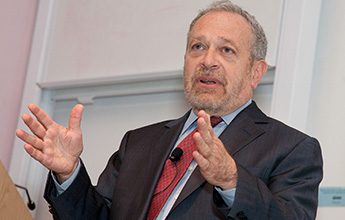 Related Articles
Related Articles
Union Busting Stalls Wage Growth

Wealth Inequality Indicator Highest
|
 |
Robert Reich: ‘The rise and fall of the American middle class correlates almost exactly with the rise and fall of private-sector unions, because unions gave the middle class the bargaining power it needed to secure a fair share of the gains from economic growth.’ Photo used under a Creative Commons license from Flickr user HarvardEthics. |
Union families largely know that in this so-called jobless recovery, most money has been going to those at the top while most poorer and middle-class gains are nonexistent.
But a recent report from Switzerland-based bank Credit Suisse shows that income inequality has passed another ominous mile marker. The ratio of the richest Americans’ wealth to average household income just hit its highest point since the Great Depression.
That’s making even the multinational investment bank nervous. “Since wealth has grown at a faster pace than income, the ratio of wealth to income has trended upwards recently,” Credit Suisse wrote in a new report released this month:
This is a worrying signal given that abnormally high wealth income ratios have always signaled recession in the past.
Even a majority of large corporations are also concerned. Another new study released by the Center for American Progress analyzed Securities and Exchange Commission filings by the nation’s largest retailers, and found that both higher-end and discount stores are worried that their customers simply don’t have enough money to spend.
“The decline of the U.S. middle class has corporate America and Wall Street scared,” wrote Brendan V. Duke and Ike Lee, the study’s authors:
Five years after the 2001 recession ended, real retail spending per person had climbed 7 percent above its prerecession level. More than five years after the end of the Great Recession – August 2014 – retail spending per person had finally reached its prerecession level.
Former Walmart U.S. CEO Bill Simon, whose company had seen consumer traffic drop for six straight quarters and same-store sales drop for five quarters, explained in July 2014 that ‘We’ve reached a point where it’s not getting any better but it’s not getting any worse – at least for the middle (class) and down.’
So, how unequal are we? Here’s an eye-popping look at the difference between people’s perceptions of wealth ownership – and how out of balance the playing field really is:
“We are heading back to levels of inequality not seen since the Gilded Age of the late 19th century,” former labor secretary Robert Reich recently wrote on his blog. “The dysfunctions of our economy and politics are not self-correcting when it comes to inequality.”
The good news? This is not inevitable, and it can be reversed, he says:
But in order to reform the system, we need a political movement for shared prosperity. We cannot have a growing economy without a growing and buoyant middle class. We cannot have a growing middle class if almost all of the economic gains go to the top 1 percent.
The University of Berkeley professor recommends several ways to help right America’s economic ship:
1. Raise the wage
Retail, restaurant, hotel and caregiving jobs make up some of the fastest-growing job sectors. “But these jobs tend to pay very little,” he says. “A first step toward making work pay is to raise the federal minimum wage … abolish the tipped minimum wage and expand the Earned Income Tax Credit. No American who works full time should be in poverty.”
2. Organize those making less
“The rise and fall of the American middle class correlates almost exactly with the rise and fall of private-sector unions, because unions gave the middle class the bargaining power it needed to secure a fair share of the gains from economic growth,” he writes. “We need to reinvigorate unions, [and] lower-wage Americans deserve more bargaining power.”
The IBEW is consistently doing that, in sectors like manufacturing, telecommunications, utilities and more.
3. Reign in Wall Street
While Reich acknowledges that some new regulations have been put in place, “The biggest banks are still too big to fail, jail or curtail – and therefore capable of generating another crisis … The financial sector has added to the burdens of the middle class and the poor through excesses that were the proximate cause of an economic crisis in 2008, similar to the crisis of 1929.” Splitting up the banks into commercial and investment categories – which the Glass-Steagall act did, until it was repealed in 1999 – is a start, Reich says.
4. Get big money out of elections
“We must limit the political influence of the great accumulations of wealth that are threatening our democracy and drowning out the voices of average Americans,” Reich writes. “The Supreme Court’s 2010 Citizens United decision must be reversed—either by the Court itself, or by constitutional amendment.”
To see how this lopsided spending hurts union workers, from right-to-work laws to attacks on collective bargaining, read our analysis in this month’s Electrical Worker showing the influence of big money in politics.
Related news:
Union Busting Stalls Wage Growth
Congress Takes Action on Wage Theft
Hill and Chilia: Stand with Low-Wage Workers
![]()